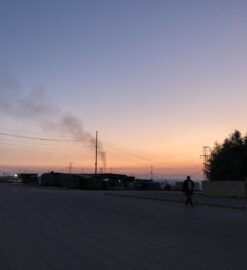European women convert, join IS
Publication: Al Monitor
AMSTERDAM, Netherlands — Vanessa, 19, was always a rebellious and spontaneous teen. Someone who liked being the center of attention and didn’t let anybody tell her what to do. After she became a teenager, she was always hanging around “tough boys” from school. They made her feel protected and safe. And just like other teens, she had boyfriends: Some were really nice, but others treated her badly.
“And when she had a nice boyfriend, she started calling him constantly, testing his limits. On the one hand she denounced rules. On the other hand, she yearned for them,’’ her mother, Mary, told Al-Monitor.
Vanessa had trouble at school. One day she got an invitation from her teacher to talk about her extreme behavior. At that time, she had already converted to Islam. Vanessa was fully covered and wore a face veil. “You might as well go straight to Syria,” the teacher said. After that conversation, she dropped out.
But beneath this exuberant personality lurked a girl who wanted nothing more than acceptance. At the age of 12, her mother asked her what she wanted to become when she grew up. Vanessa said that she wanted to get married and have kids at the age of 16.
“I think she was looking for a father figure,’’ Mary said, adding that she and Vanessa’s father split up when Vanessa was just a little girl.
During the summer, Mary found that her daughter was in contact with a boy abroad, but she didn’t think much of it, even when Vanessa changed her relationship status on Facebook from “single” to “engaged.” She told her mother that she wanted to “deter boys,” because they were sending her friend requests.
This entire story turned out to be false.
At the beginning of August, when her mother was out of town, Vanessa booked a ticket to Turkey, near the Syrian border. According to her mother, the boy she had been talking with over Skype was an Islamic State (IS) fighter from Europe who had lived in Syria for over a year. After arriving in Turkey, a Turkish family working with IS took her in. She got a little scared as she was not allowed to leave, and called her mom worried sick, who advised her to call the Turkish police. Vanessa said this wouldn’t help because “they were all corrupt.”
The next day, fighters picked her up and drove her to Syria, and her doubts faded away. After arriving, she posted a picture of herself on social media, wearing a black face veil. “If Allah wants you to perform hijra [immigration to a Muslim country], he will make sure it happens. Sisters, do not hesitate. It feels like home over here,’’ she wrote.
Two days later, she got married.
Over the past two years, hundreds of European women — roughly 10% of recruits from the West between the ages of 18 and 25 — have traveled to Syria or Iraq to join militant groups like Jabhat al-Nusra or IS. This number includes at least 70 French, 60 British, 40 German, 20 Belgian and 35 Dutch women. They traveled by themselves or with their husbands, and sometimes with children, female friends or close relatives.
Social media plays a crucial role in their recruitment. Jihadist girls who live in Syria offer advice, support and help with travel. “We need more women to take care of the women and children. It doesn’t matter if you are young or old, with or without children, divorced or widowed. Women who are interested can contact me in private,” a Belgian jihadist who joined IS wrote on her account.
Female jihadists portray their life in “the caliphate” as a paradise for Muslims. Snapshots of sunsets, smiling militants with cats and dinners with their Muslim sisters — all taken in Bilad al-Sham. They portray a picture of a domestic Islamic life which includes taking care of their husbands — the “fighting lions” — and the household.
Their updates about sisterhood and marriage sound caring. However, when they talk about the kuffar [non-believers] in Europe and the United States, they sound furious. They think that the West is waging a “war against Islam.”
“Muslims should stay away from the kuffar. We must hate their deeds and way of life. Do not unite with them,” a European woman living in Raqqa wrote on her Facebook page.
They also post pictures of their guns and little kids holding guns. On a Twitter page with IS propaganda and photos of dead bodies, a British female jihadist said she wanted to be “the first UK woman to kill a Westerner.” This was said after James Foley was killed.
In August 2013, Ghouta was struck by a large-scale attack with chemical weapons. Anne, a mother of two, told Al-Monitor that her daughter Aisha,18, was touched by what she saw on the news. Therefore, she started collecting clothing, toys and blankets for Syrian refugees.
Just like Vanessa, Aisha converted to Islam. According to Anne, she found comfort in this religion after years of trying to deal with a traumatic event that happened in the past. “She converted in August 2013. A few months later she started wearing a niqab. I had the feeling that she did this to hide herself, like she wanted to disappear,’’ Anne told Al-Monitor.
For her part, Mary added, “When I was fighting cancer, Vanessa was afraid that I would die. She found comfort in Islam.”
The war in Syria attracted thousands of European Muslim fighters. One of them was Yilmaz, a jihadist who used to be a soldier for the Dutch army. He traveled to Syria in 2012. On Jan. 26, 2014, Anne and Aisha watched a Dutch TV show where Yilmaz explained his motives: topple the regime and help the Syrian people. The way he spoke about his mission and his willingness to die for such a cause left an impact on Aisha.
“For her, he was a Muslim version of Robin Hood,’’ Anne said, adding that Aisha contacted the fighter on social media after the show. She told him about her wish to set up an orphanage for Syrian refugees. “Come over here then,” he suggested. The two kept in contact. Aisha fell in love and they got married over Skype.
By the end of February, she traveled to Syria.
It’s not only marrying a fighter that attracts European women. It’s also living under Sharia law, help building an Islamic state and perform jihad that makes them join extremist groups. When Abu Bakr al-Baghdadi declared the caliphate, he asked Muslims from all over the world to join. In July, 1,000 foreign fighters joined IS, the Britain-based Syrian Observatory for Human Rights said.
Although most of the women fulfill traditional roles such as getting married or giving birth to children, they are allowed to work. After all, in an area where the public lives of men and women are completely separate, female doctors, nurses, teachers and Sharia police officers are much needed.
An English jihadist explained what women can expect. “We have public transportation, running water, good hospitals, women’s centers, Internet cafes and so on. IS is working on new facilities only women will benefit from. There is plenty to do here, even if you’re not married. Single women stay in the house and get a monthly allowance.”
Vanessa told her mother over the phone that she doesn’t want to come back to the Netherlands. Her husband is nice, she said, better than all the other boys she dated. He respects her.
Mary showed Al-Monitor a picture of them. Him: dark curls, brown eyes and an athletic body. Her: dark eyes which are highlighted by a black veil and eyeliner. Through the piece of clothing, you can tell that she is smiling. “Nice picture, right? If you don’t pay attention to the gun in his hand.’’
Mary smiled, but her eyes looked sad. She cannot understand why her daughter lives in a country where bombings are part of daily life and where people are getting decapitated. The US-led air strikes on IS targets worry Mary, but Vanessa is not afraid. On the contrary: Dying as a martyr is her greatest wish, as she believes she will go straight to paradise.
Unlike Mary, Anne hasn’t had contact with her daughter for over seven months. Out of the blue, Aisha’s Facebook page was empty and her phone was cut off. “After a while, I contacted her husband [Yilmaz], and he said that they got a divorce, and that she married an IS fighter in Raqqa,’’ Anne explained.
Anne contacted a lot of Dutch and Belgian women inside Syria, but nobody has seen her. “I want to go look for her myself, even if that means I will not come back. My life is worthless without her.”
The names in this story have been changed.



Leave a Reply